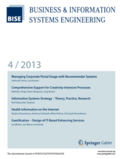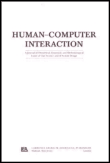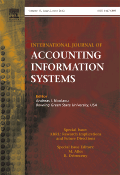
Communications of the Association for Information Systems
Scope & Guideline
Fostering Global Collaboration in Information Systems Scholarship
Introduction
Aims and Scopes
- Interdisciplinary Research in Information Systems:
CAIS promotes interdisciplinary research, encouraging contributions that bridge various domains such as computer science, business management, social sciences, and education, providing a holistic view of information systems. - Methodological Diversity:
The journal values diverse research methodologies, including qualitative, quantitative, and mixed-methods approaches, to address complex IS challenges and foster innovative solutions. - Focus on Emerging Technologies:
Research on emerging technologies such as AI, blockchain, and IoT is a core area, exploring their implications for business processes, governance, and societal impact. - User-Centric Studies:
A significant emphasis is placed on user experiences and human-computer interaction, examining how individuals and organizations interact with technology. - Ethical and Social Implications of IS:
The journal seeks to address ethical considerations and societal impacts of information systems, particularly in the context of big data, privacy, and digital equity. - Educational Innovations in IS:
CAIS also highlights innovative pedagogical approaches within IS education, sharing best practices and insights to enhance teaching and learning outcomes. - Sustainability and Social Responsibility:
Research that integrates sustainability and social responsibility within the IS context is encouraged, reflecting a commitment to addressing global challenges.
Trending and Emerging
- Artificial Intelligence and Machine Learning:
AI and machine learning are prominent topics, with research exploring their applications in various domains, including healthcare, education, and business processes, indicating a strong interest in these transformative technologies. - Data-Driven Decision Making:
The shift towards data-driven decision-making is a growing theme, with studies examining how organizations leverage data analytics to enhance operational efficiency and strategic planning. - Digital Transformation and Innovation:
Research focusing on digital transformation and innovation is trending, as organizations seek to adapt to rapidly changing technological landscapes and consumer behaviors. - Ethics and Governance in IS:
Ethical considerations and governance frameworks related to data privacy, security, and the responsible use of technology are increasingly emphasized, reflecting societal concerns. - User Experience and Human-Centric Design:
There is a rising focus on user experience and human-centric design in information systems, emphasizing the importance of user engagement and satisfaction in technology adoption. - Sustainability and Green IT:
Research on sustainability and green IT practices is gaining momentum, as organizations aim to align their IT strategies with environmental goals and corporate social responsibility. - Impact of COVID-19 on IS Practices:
The ongoing impact of the COVID-19 pandemic on information systems practices, including remote work and digital learning, is a significant area of exploration, highlighting adaptive strategies and lessons learned.
Declining or Waning
- Traditional IT Management Practices:
Research focused solely on traditional IT management practices has seen a decline, as newer topics related to digital transformation and agile methodologies gain traction. - Static Frameworks for IS Development:
The application of static frameworks in information systems development is becoming less common, with a growing preference for dynamic and adaptive approaches that better suit the fast-paced technological environment. - Legacy Systems and Infrastructure Studies:
Studies centered on legacy systems and traditional infrastructure are decreasing, as organizations increasingly prioritize cloud computing and modern digital architectures. - Narrowly Defined IS Theories:
Research that relies heavily on narrowly defined IS theories without considering broader interdisciplinary perspectives is becoming less prevalent, as a more holistic approach is favored. - Focus on Local or Regional Studies:
There is a noticeable reduction in research that focuses exclusively on local or regional contexts, as global and comparative studies are increasingly prioritized to address universal challenges.
Similar Journals

Business & Information Systems Engineering
Bridging Theory and Practice in Information SystemsBusiness & Information Systems Engineering is a premier journal dedicated to the intersection of business and information systems, published by SPRINGER VIEWEG-SPRINGER FACHMEDIEN WIESBADEN GMBH in Germany. With an impressive 2023 impact factor placing it in the Q1 category in Information Systems, this journal stands out for its rigorous peer-reviewed research that addresses the dynamic challenges faced by businesses in the digital age. Spanning from 2009 to 2024, it showcases empirical studies, theoretical frameworks, and practical applications, ensuring relevance for both researchers and practitioners alike. As part of the Scopus rankings, it is recognized within the top 93rd percentile in the field of Computer Science, specifically Information Systems, ranking #26 out of 394 journals. Currently, the journal operates under a non-open access model, thus providing a platform for high-quality research while maintaining exclusivity. Engaging with this journal is essential for anyone looking to stay at the forefront of developments in business and technology integration.

HUMAN-COMPUTER INTERACTION
Fostering Collaboration Between Humans and MachinesHUMAN-COMPUTER INTERACTION is a premier academic journal published by Taylor & Francis Inc, dedicated to the interdisciplinary field of HCI, which explores the dynamic interactions between humans and computers. With its ISSN 0737-0024 and E-ISSN 1532-7051, the journal maintains a strong presence within the academic community and is recognized for its significant impact, holding a commendable impact factor that underscores its relevance. Ranked in the Q1 category for both Applied Psychology and Human-Computer Interaction, it occupies a critical position in Scopus rankings, listed as #15 in Applied Psychology and #11 in Computer Science, Human-Computer Interaction, placing it in the top 6% of relevant fields. Covering a broad spectrum of topics from usability studies to user experience design, the journal aims to facilitate innovative research and provide insights that bridge theoretical frameworks and practical applications. Published since 1985 and continuously evolving, HUMAN-COMPUTER INTERACTION remains an essential resource for researchers, professionals, and students eager to contribute to and benefit from advances in understanding how technology can effectively serve human needs.

EUROPEAN JOURNAL OF INFORMATION SYSTEMS
Elevating Knowledge in Information Systems since 1995The EUROPEAN JOURNAL OF INFORMATION SYSTEMS, published by Taylor & Francis Ltd, stands as a premier platform for groundbreaking research in the domains of Information Systems and Management. With an ISSN of 0960-085X and E-ISSN 1476-9344, this esteemed journal has been at the forefront of academic discourse since its inception in 1995, converging insights and innovative methodologies that reflect the dynamic landscape of information technology. Recognized for its excellence, the journal achieved a Q1 ranking across multiple categories in 2023, including Information Systems and Library & Information Sciences, underscoring its vital role in shaping contemporary research. Operating from the UK, the journal fosters an engaging scholarly community while offering researchers and practitioners insights that drive both theoretical advancement and practical application. Although it does not currently provide open access options, the journal's reputation for high-impact content makes it an essential resource for those who strive to advance the field. With an enduring commitment to quality, the EUROPEAN JOURNAL OF INFORMATION SYSTEMS continues to inform, inspire, and connect the next generation of scholars and professionals.

Informatics-Basel
Bridging Ideas in Communication and TechnologyInformatics-Basel is a leading international, peer-reviewed journal published by MDPI that has been at the forefront of disseminating high-quality research in the field of informatics since its establishment in 2014. Based in Switzerland, this Open Access journal strives to provide a platform for innovative studies across various domains, including Communication, Computer Networks and Communications, and Human-Computer Interaction, demonstrating its strong impact within these fields with impressive rankings: Q1 in Communication and Q2 in both Computer Networks and Communications and Human-Computer Interaction. Researchers and scholars are encouraged to contribute to the advancing dialogue on critical issues and emerging technologies, as evidenced by its esteemed Scopus rankings, placing it in the top percentiles of its respective categories. With its commitment to elevating knowledge accessibility, Informatics-Basel has become an essential resource for the academic community, stimulating collaboration and the sharing of ideas from 2014 to 2024 and beyond.

IEEE Consumer Electronics Magazine
Shaping Tomorrow's Consumer Electronics TodayIEEE Consumer Electronics Magazine, published by the IEEE INSTITUTE OF ELECTRICAL AND ELECTRONICS ENGINEERS INC, is a premier journal dedicated to disseminating cutting-edge research and insights in the fields of consumer electronics, engineering, and computer science. With an ISSN of 2162-2248 and an E-ISSN of 2162-2256, this quarterly publication serves as an essential resource for practitioners, researchers, and academics alike, highlighting innovative advancements and applications. As a testament to its scholarly impact, the journal ranks in the Q2 quartile across multiple categories, including Computer Science Applications, Electrical and Electronic Engineering, Hardware and Architecture, and Human-Computer Interaction, reflecting its crucial role in shaping the landscape of consumer technology. Although not an open access journal, it offers a multitude of access options for its readers and has successfully navigated the evolving technology sector since its establishment in 2012. For those keen to further their understanding of consumer electronics, this magazine is not just a publication, but a hub for knowledge and innovative thinking.

Journal of Web Engineering
Pioneering Research in Computer Networks and CommunicationsThe Journal of Web Engineering, published by RIVER PUBLISHERS, serves as a pivotal platform for researchers, professionals, and students interested in the expanding fields of web technologies and engineering. Since its inception in 2008, this journal has dedicated itself to advancing knowledge and promoting innovative practices in Computer Networks and Communications, Information Systems, and Software Engineering. With an impressive convergence of research up to 2024, its Q3 quartile ranking in both Computer Networks and Communications and Information Systems reflects the journal's commitment to the dissemination of high-quality, impactful research. Although it operates as a traditional access journal, it allows for vital contributions to be shared widely among a diverse readership. The Journal of Web Engineering's rankings in Scopus, including a percentile placement of 28th in Computer Networks and Communications, demonstrate its relevance and growing significance in the academic landscape. As the digital world continuously evolves, this journal remains a crucial resource for exploring the latest advancements and theoretical reflections within the realm of web engineering.

International Journal of Accounting Information Systems
Empowering Scholars with Cutting-Edge Insights in Accounting SystemsInternational Journal of Accounting Information Systems, published by Elsevier, is a premier academic platform dedicated to advancing scholarship in the intersecting fields of accounting, finance, and information systems. With a robust impact factor reflective of its standing, this journal has maintained a Q1 ranking across multiple categories as of 2023, including Accounting, Finance, and Management Information Systems. By disseminating high-quality research, the journal serves as an essential resource for academics, practitioners, and students who seek to deepen their understanding of innovative accounting practices and information system technologies. Established in 2000, the journal consistently showcases cutting-edge research and case studies that resonate with contemporary challenges in the business environment. Subscribers can benefit from a wealth of knowledge that informs both theory and practice, furthering the development of effective accounting information systems and strategic management decisions.

Computer Science and Information Systems
Advancing Frontiers in Computer Science and Information SystemsComputer Science and Information Systems, an esteemed journal published by the COMSIS CONSORTIUM, serves as a vital platform for researchers and practitioners within the field of computer science and information systems. With an ISSN of 1820-0214, this open access journal has been disseminating high-quality research since 2004, making scholarly content readily accessible to a global audience. Based in Novi Sad, Serbia, the journal has established itself as a point of reference in the academic community, achieving a Q3 ranking in the Computer Science (miscellaneous) category as of 2023. With its coverage spanning from 2008 to 2024, it caters to a diverse range of topics, including software engineering, data processing, and system architecture. Although the HIndex is currently not available, the journal holds a respectable 43rd percentile ranking in the Scopus database for general computer science, showcasing its relevance in the field. By offering an open access model, it ensures that groundbreaking research can be freely accessed and utilized, fostering innovation and collaboration across disciplines.

Electronic Markets
Advancing Knowledge in Electronic MarketsElectronic Markets, published by Springer Heidelberg, stands as a premier academic journal in the realm of Business and International Management, Computer Science Applications, and Economics, among other fields. With an impressive impact factor and consistent recognition in the top quartile (Q1) of multiple categories, this journal facilitates the dissemination of pioneering research that explores the intersections of technology, commerce, and consumer behavior. Covering a broad spectrum of pertinent topics from market innovation to economic implications of digital platforms, Electronic Markets serves as a vital resource for researchers, professionals, and students intent on understanding the evolving landscape of electronic commerce. The journal showcases rigorous peer-reviewed articles, ensuring the highest standards of scholarly excellence. Its long-standing reputation and comprehensive scope make it an essential publication for those engaged in the critically important dialogue around digital transformation in today's economy.

Australasian Journal of Information Systems
Fostering Innovation in Digital Research.The Australasian Journal of Information Systems (AJIS), published by the University of Canberra’s Faculty of Information Sciences & Engineering, is a leading open-access journal that has been fostering scholarly communication in the realms of information systems and technology since its inception in 1993. With an ISSN of 1449-8618 and E-ISSN 1326-2238, the journal is headquartered in Australia and provides a platform for innovative research and thought leadership in key areas such as business management, human-computer interaction, and information systems management. Recognized for its quality and impact, AJIS boasts a commendable Q2 ranking in several categories including Information Systems, reflecting its relevance and significance in the academic community. Researchers, professionals, and students alike will find this journal not only instrumental for advancing their knowledge but also essential for engaging with contemporary issues and trends in information sciences. With a commitment to open access, AJIS ensures that high-quality research is widely accessible, fostering collaboration and discourse across international boundaries.